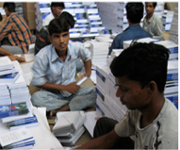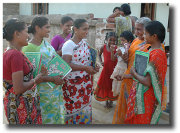 |
| (Photo courtesy of BFTW) Bible Distribution Center |
Nepal (MNN) ― A new crisis seems to be looming over Nepal's fragile peace process.
This week, the government and the judiciary locked horns in a question of another extension to the Constituent Assembly term.
The Supreme Court had given three options if the Constituent Assembly failed to draft a new Constitution before May 28, 2012: Take a referendum, conduct fresh polls to elect a new body to draft the constitution, or seek some other alternative.
Apparently fed up with the slow progress, the Courts reject petitions for another extension should a draft fail to emerge in May. In 2008, the legislative body was given two years to draft Nepal's new constitution, but despite four extensions, the task is no closer to completion than it was when the CA was given its mandate.
However, some of the penal codes were re-written, and Christians were alarmed at the wording of anti-conversion legislation that could seriously complicate outreach.
Against that backdrop, Bibles For the World is launching the New Year with a new project: Bibles For Nepal.
BFTW's Mawii Pudaite says despite the ongoing changes in the government and concerns about religious freedom, Christianity remains the fastest-growing religion in the country. "We believe that it is an important time to plant Gospel Seeds in Nepal that will bear much fruit in the years to come."
With a roughly 48% literacy rate, BFTW is directly targeting this demographic for Scripture distribution, evangelism and discipleship. She explains that what often happens is development in the community. "These efforts will also have an indirect-multiplying effect among the illiterate population, as local churches and new believers engage their communities with the Gospel."
While the window remains open, the ministry is moving ahead with plans for 2012. "We have made contacts with the leaders of these various groups and churches in Nepal, and they enthusiastically are responding to working with us in the distribution and follow-up ministries."
The next step, Pudaite notes, is printing and distributing the resources. "Claiming Nepal for Christ and His Kingdom will take prayer and resources to provide the tools: Bibles, New Testaments, and Gospels to do the job of evangelism, discipleship and church planting."
Dr. John Stotts was noted for saying, "The Bible is the best tool for evangelism." Change for Nepal can come from within. "Today I am asking you to join me in praying for the people and country of Nepal. Let us claim the nation of Nepal for Christ and His Kingdom."
The pace of the project is dependent on the funding they receive. They're also mobilizing prayer teams to pray for Nepal. Check our Featured Links if you want to explore more with Bibles For The World.


